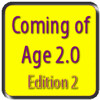A busman's holiday
I’m on holiday. A busman’s holiday, to be exact. Doing plenty of writing, exploring, catching up. Read on for information about some things I’ve been doing and articles coming up, and an article I wrote about identity theft, but not as we usually understand it…
I’m not sure if the term “busman’s holiday” is known outside the UK, so here is a quick explanation. It means doing the same thing on holiday as you do in everyday life, like a bus driver going on a motoring holiday, according to Nigel Rees in “A Word in Your Shell Like”.
So, first, as a bit or relaxation, I wrote an article about identity theft, but in a different sense to the usual. That’s here:
http://terryfreedman.blogspot.com/2007/08/identity-theft.html
Then I wrote an article about professional development, which I shall post here shortly, followed by an exploration of Voicethread, Animato, and Flickr (again). All that is in an article too, which will be published here shortly. Both of those articles are from the forthcoming second edition of “Coming of Age: An Introduction to the New Worldwide Web”.
I also took part in a Flashmeeting meeting, which Paul Harrington has reported on. It was stupendous, and Paul is writing a practical article for this website about its usefulness in education. And a teacher called Lisa Parisi is working on an article for me about the practical things to take into account when running in-service courses for co-workers.
And I’ve been researching for an article I’ve been commissioned to write about Web 2.0 for the Times Educational Supplement. I’ll let you know when that appears. I’m doing it on digital photography, so if you have any great tips, websites or applications, let me know (credit given if used, of course)!
I have found time to relax too, as you can see from my latest pictures.
And now I am going off to relax a bit more — with a podcast!
 On the 22nd November 2007 I attended a seminar called “Secondary Curriculum – Evolution and Innovation”.
On the 22nd November 2007 I attended a seminar called “Secondary Curriculum – Evolution and Innovation”. 




 Sorry about the appalling grammar of the title, which was heavily influenced by a blues song called "Use what you got".
Sorry about the appalling grammar of the title, which was heavily influenced by a blues song called "Use what you got".




 I recently gave a talk at the Westminster e-Forum on behalf of
I recently gave a talk at the Westminster e-Forum on behalf of 





 Find out about a prize draw, how to find out about the next edition of Coming of Age, a social networking survey and more.
Find out about a prize draw, how to find out about the next edition of Coming of Age, a social networking survey and more. This Special Edition of Practical ICT is based on the Ofsted (Office for Standards in Education) report called “The Annual Report of Her Majesty’s Chief Inspector of Education, Children’s Services and Skills 2006-07, published on 17 October 2007.
This Special Edition of Practical ICT is based on the Ofsted (Office for Standards in Education) report called “The Annual Report of Her Majesty’s Chief Inspector of Education, Children’s Services and Skills 2006-07, published on 17 October 2007.

 What can a story about a traditional Persian folk hero teach us about management? In this article, I look at the Mullah's experiment with improving his donkey's running costs, and the lessons we can learn from it.
What can a story about a traditional Persian folk hero teach us about management? In this article, I look at the Mullah's experiment with improving his donkey's running costs, and the lessons we can learn from it.
 After much deliberation, we’ve launched a new e-journal called Practical ICT (for Leaders and Managers of Educational Technology). We were discussing this, and sounding out potential contributors, over a year ago. And now, with an author-friendly contract approved by the UK’s Society of Authors, we are ready to roll.
After much deliberation, we’ve launched a new e-journal called Practical ICT (for Leaders and Managers of Educational Technology). We were discussing this, and sounding out potential contributors, over a year ago. And now, with an author-friendly contract approved by the UK’s Society of Authors, we are ready to roll. In this latest edition we cover:
In this latest edition we cover:
 Many teachers come bounding back from the long summer break full of energy and enthusiasm, and if you're starting in a new job altogether there is the additional wish to create a good first impression.
Many teachers come bounding back from the long summer break full of energy and enthusiasm, and if you're starting in a new job altogether there is the additional wish to create a good first impression.



 A blogroll is a list of blogs that one is reading, or at least that one subscribes to, and which one recommends to others. This article is a quick how-to guide on how to set one up.
A blogroll is a list of blogs that one is reading, or at least that one subscribes to, and which one recommends to others. This article is a quick how-to guide on how to set one up.

 You might wonder what qualifies me to write about cultural change in an organisation. Well, I’ve done it several times, and I thought I’d set myself the challenge of trying to describe some of the success stories I’ve enjoyed in 250 words or fewer.
You might wonder what qualifies me to write about cultural change in an organisation. Well, I’ve done it several times, and I thought I’d set myself the challenge of trying to describe some of the success stories I’ve enjoyed in 250 words or fewer. 
